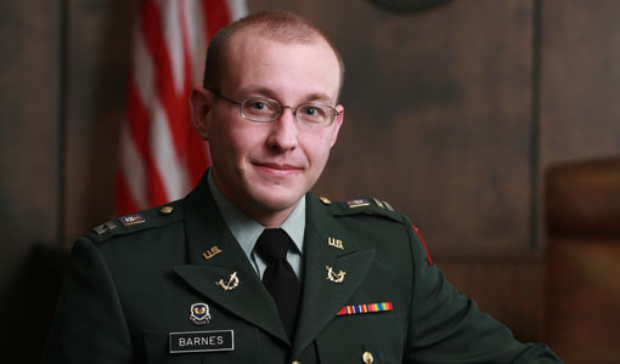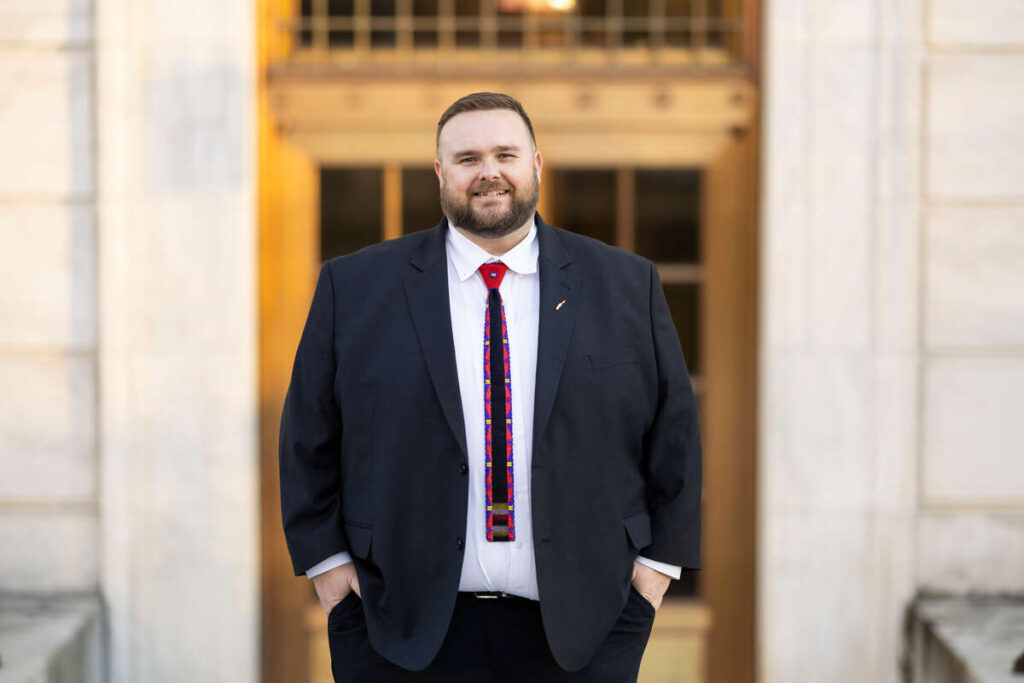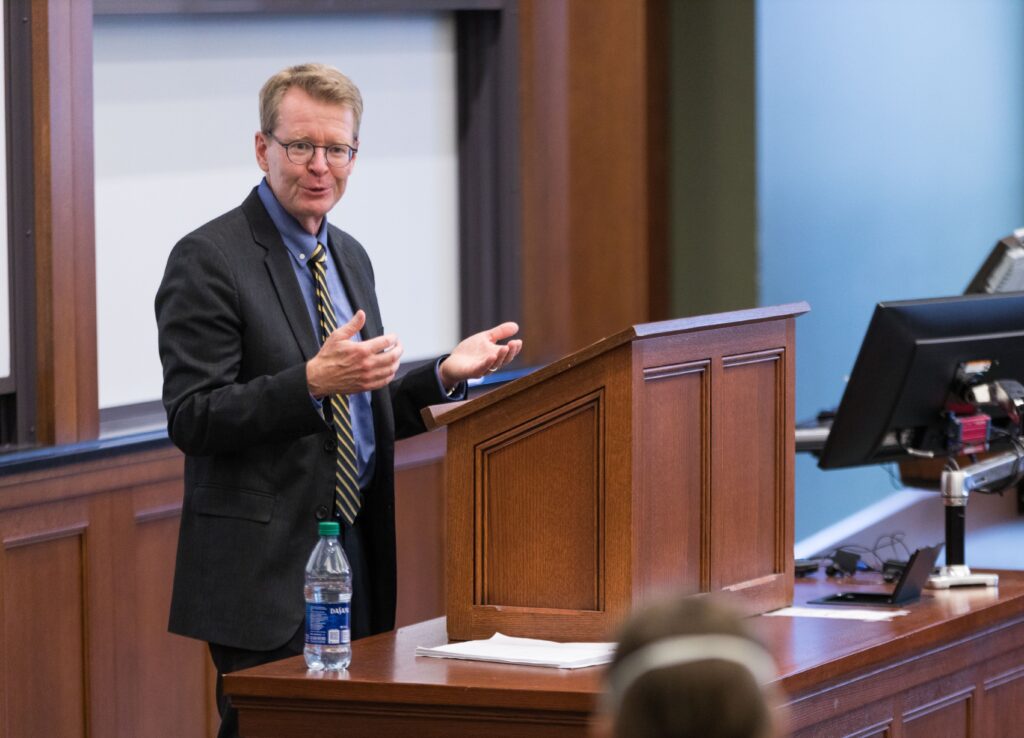Justin Barnes ’06 long has been fascinated by relationships – among ideas and especially between people. That fascination led him to study at the University of St. Thomas School of Law and to become a U.S. Army captain, practicing as an administrative law attorney and assistant U.S. attorney at Fort Leavenworth, Kan.Barnes learned about relationships by growing up “on the move” and living in several states. A self-described “geek” as a teen, he was intrigued by computers and saw the potential of the Internet to link people together, not just to provide information.
Barnes began to consider law at an early age – “at about age seven, when I realized I couldn’t add,” he smiled. “I knew then I’d never be a doctor or an astronaut.” He was fascinated by law because it regulates interactions between people. “I’m still amazed by the law’s give and take,” he said. “Two perfectly reasonable people can read the same statute and come up with different interpretations – and both can be wrong.”
The path Barnes took to the School of Law began with a relationship, as well. His roommate at Indiana University had begun his collegiate career at the St. Paul Seminary at the University of St. Thomas. “He had only good things to say about St. Thomas,” Barnes said. “When he heard about St. Thomas’ new law school, he badgered me to apply. Basically, I applied just to get him off my back.”
After he was accepted, Barnes visited the law school. What he saw convinced him that the School of Law was right for him. “I spoke to several administrators and was really impressed with what they were trying to do,” he said. “I thought the mission was admirable. Beyond that, I wanted to get in on the ground floor of something I believed would be successful.”
The School of Law surpassed his expectations. “I absolutely loved law school,” he said. “The classes were great.” Barnes also was on the staff of the Law Journal, serving as managing editor as a 3L. He and the staff modified the journal’s structure, added an issue, changed the editing process and reached out to faculty. “Building the law journal’s structure from the ground up is something you only can do at a new law school.”
He especially appreciated real-life opportunities. When he was a 2L, the Minnesota Justice Foundation connected him with the Ramsey County Public Defenders Office. There he worked as a certified student attorney, representing people charged with misdemeanors in their initial court appearances.
In addition to being exposed to a part of the community he had never seen before, “I saw nuances of the law that can only be learned by doing,” he said. “I didn’t know how hard it is to find the right answers until I was in those situations. Rarely was there absolute right or wrong. Most often we tried to thread a narrow path between the two, both for the client and for society.”
Relationships were a critical part of Barnes’ School of Law experience. He remembers Associate Professor Mitchell Gorden’s “butter man” story and has “used it with great frequency here in the Army.” Although they “didn’t often agree,” Associate Professor Robert Delahunty is “one of the sharpest minds I’ve ever met.” Professor Charles Reed was both “exasperating” for a law journal editor and “extraordinarily brilliant.”
Barnes said he also learned much from talking with his classmates in the law library or in the halls. He especially noted his law journal colleagues, including articles editor Andrea Specht, publications editor Lucas McMillen and editor-in-chief Beth Forsythe.Barnes’ military career began early in law school. He was selected as a 1L to be a JAG Corps intern, and spent the summer in Germany “doing more than anyone should allow a first-year law student to do,” he said. He didn’t think too much about military law until his third year, when he was selected for his current position, one that was deferred for a year while Barnes clerked in the Minnesota Court of Appeals for Judge Bruce Willis. Once Barnes entered the Army, he spent three months at a military law school and 11 weeks in an officer leadership course, learning how to be both a military lawyer and a soldier.
The office in which Barnes works includes nine attorneys, two of whom are civilians, and two paralegals. “They are remarkable people. I’m lucky to interact with them,” he said. “I don’t think you find that in every profession.”
The lawyers divide their work by practice areas. Some help soldiers and their dependents with personal legal issues. Some try court martials. Barnes practices administrative and civil law – anything in which the military is the client, except criminal law. That includes labor law, government contracts, fiscal reviews and interpreting Army regulations. He also serves as a legal adviser in Article 32 hearings, the military equivalent of a grand jury hearing, advising the investigating officer. As the assistant district attorney, he also prosecutes civilians who commit crimes on the base.His favorite part of the job is its unpredictability. “I never know what will come across my desk,” Barnes said. “Nothing is routine.”
Barnes chose military law for several reasons. First, he didn’t want “a typical lawyer job – not that those jobs aren’t important,” he explained. He wanted the broadest range of work possible. Second, he wanted a lot of responsibility. “You have to hit the ground running here and the ground moves with you.” Plus, he wanted to give back. “I don’t want to be melodramatic about it, but I believe that people like me, who have been given every opportunity, should do some kind of community service.”
As a military lawyer, his client is the United States. “Playing even a small role in something so big is very rewarding.”
Barnes believes the School of Law prepared him well for that role. “St. Thomas gave me the opportunity to take ideas and work with some very smart people and run with those ideas,” he said. “As students at a new school that was still developing its institutional history, we built toward long-term objectives based on shared values. That’s not unlike what I do in the military.”
Read more from St. Thomas Lawyer.





